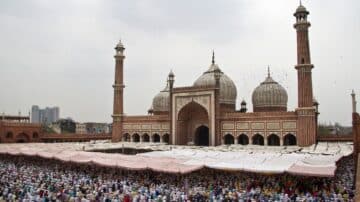Islam is a social religion that aims at providing manners and customs relating to every aspect of life, even the celebration of `Eids. Islamic manners and customs are not practiced unconsciously; they are derived from the two main sources of Islam; namely, the Qur’an and the Sunnah. Therefore, they are in the strictest sense divinely inspired.
The life of Prophet Muhammad (peace and blessings be upon him) provides many concrete examples of good manners: to act justly between two people, to help a man onto his mount, to help him load his belongings, to speak good words, to remove nuisances from paths or roads, to give food and water to stray dogs and cats, to be first in greeting others, to visit relatives, etc. Even the marital intimate relation is valued as a good deed.
The most inclusive characteristics of the ideal Muslim personality should be humility, modesty, and simplicity or naturalness (lack of affectation). Pride and arrogance in any aspect of conduct are not accepted, as no individual is superior to another except by way of his or her degree of faith and contribution of good deeds.
Social relations are valued because they prevent or limit isolation of the individual. Social customs are valued because they create stability and harmony in social relations. Thus, clothes that show haughtiness or flaunt social status are forbidden. Manners of eating should demonstrate humility before the occasion, as well as respect for the meal.
The function of Islamic manners in unifying Muslim communities, as well as being an expression of their unity, is clear. But Islamic manners are not just about coherence or consistency of behavior; they are about coherence or consistency of the right behavior.
Comprehensive and Morality in `Eid
In Eid, social manners should be highly respected in a way that pleases others and does not hurt anyone. Here are some of the manners of Eid.
Share your food. Islam recommends Muslims to share food whenever possible. `Eid Al-Adha is a great opportunity to share parts of the slaughtered animal with others as a sign of love, care, and thus of community integrity. Islam even encourages Muslims to hold feasts from time to time and invite others to these occasions.
Eating together renders stronger the social ties among the members of a community, irrespective of social status. This is why Islam disapproves the feast to which the rich are invited and from which the poor are excluded, and considers it the worst of feasts.
Spread kindness. Among the main aims of Islamic manners is to help in establishing and maintaining healthy social relationships. Among the necessary attributes of the ideal Muslim personality are honesty, respect for others, honoring one’s word, restraining anger, patience, modesty, and kindness. These virtues eliminate mistrust and create trust, and this is the necessary foundation upon which sound relations can be built and developed.
In the Islamic view, it is not enough to simply avoid doing harm to others, or even to wish others what you wish yourself. What is required of Muslims toward one another is mutual responsibility and positive assistance.
Avoid too much formality. Formality in manners, especially during `Eids, should be reduced to the barest possible minimum. This enables freer social intercourse, makes the social machinery run more smoothly, and facilitates meetings.
Muslims are encouraged to meet with one another, for that strengthens social bonds and guards the individual against the psychological consequences of social isolation. Moreover, Muslims are encouraged to meet frequently. It is the duty of the host to be hospitable and generous to his or her guest. Acceptance of an invitation to a meal is highly recommended and encouraged in Islam.
Spread the spirit of brotherhood. Visiting the sick, taking part in funeral processions, offering condolences to the bereaved, comforting and encouraging them, providing them with food, exchanging gifts with other members of the society, shaking hands when meeting or parting, sharing in other happy occasions such as weddings and births, etc., are all ways to strengthen and develop social relations. Particular importance is attached to such exchanges among relatives and neighbors during `Eids.
Do everything for the sake of Allah. Social relations should be quite free of personal interest and should be wholly established for the sake of Allah. Thus, a Muslim should not accept a gift presented by someone who intends thereby to influence him or her for a personal interest.
Come Together. In Islam, social life is encouraged at a wide level; namely, by meetings at the level of the community as a whole. It is recommended that the five Prayers prescribed in Islam be performed in congregation in the mosque. The weekly gathering for Friday Prayer is obligatory for every Muslim, with certain exceptions. Also, there are the two annual occasions of Eid Al-Fitr and Eid Al-Adha. Moreover, millions of Muslims from all over the world meet in Makkah every year for a few days during the season of Hajj. Indeed, Islam is a social religion.
By Dr. M. Mukarram Ahmed
Excerpted with modifications from the author’s book Encyclopedia of Islam.

